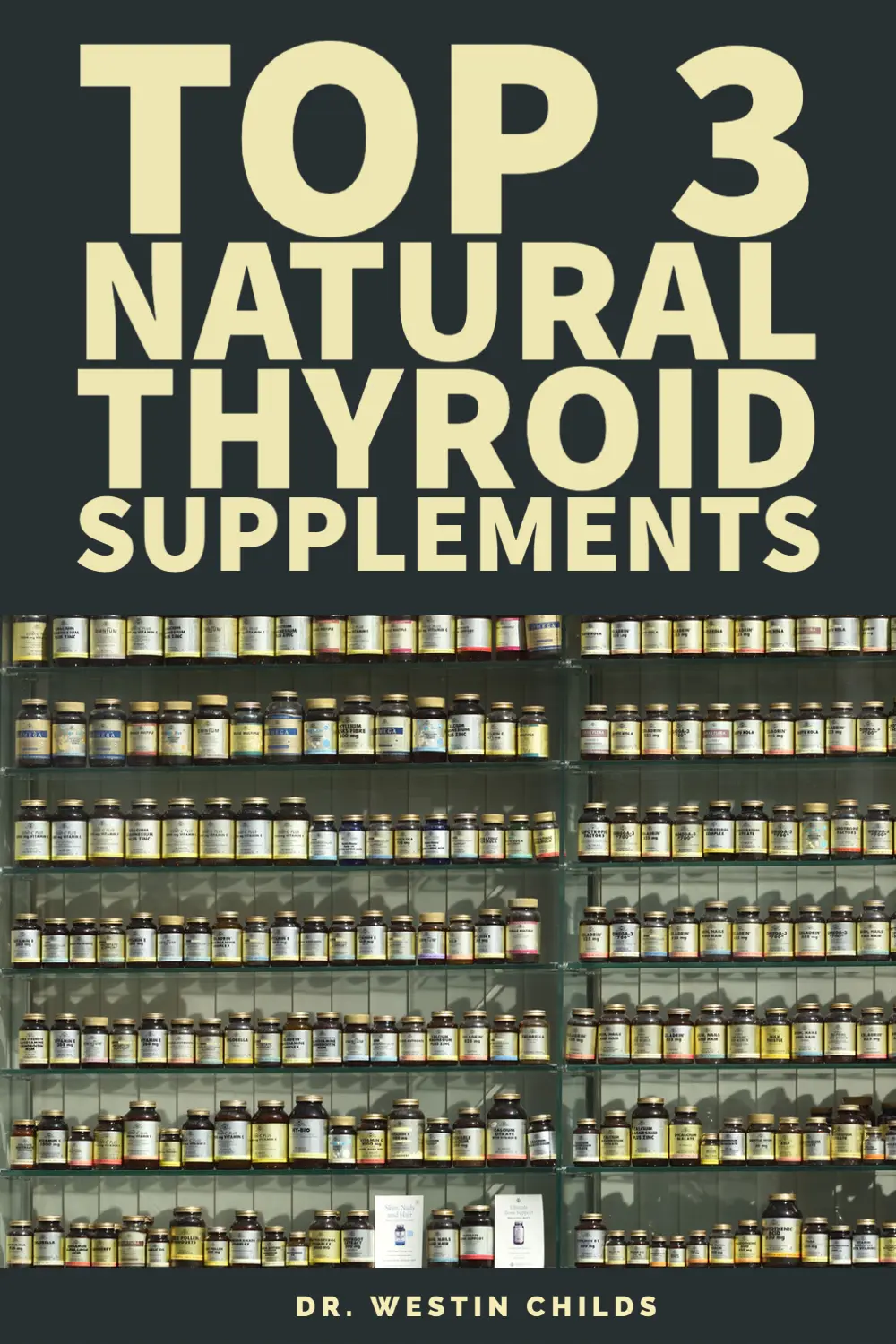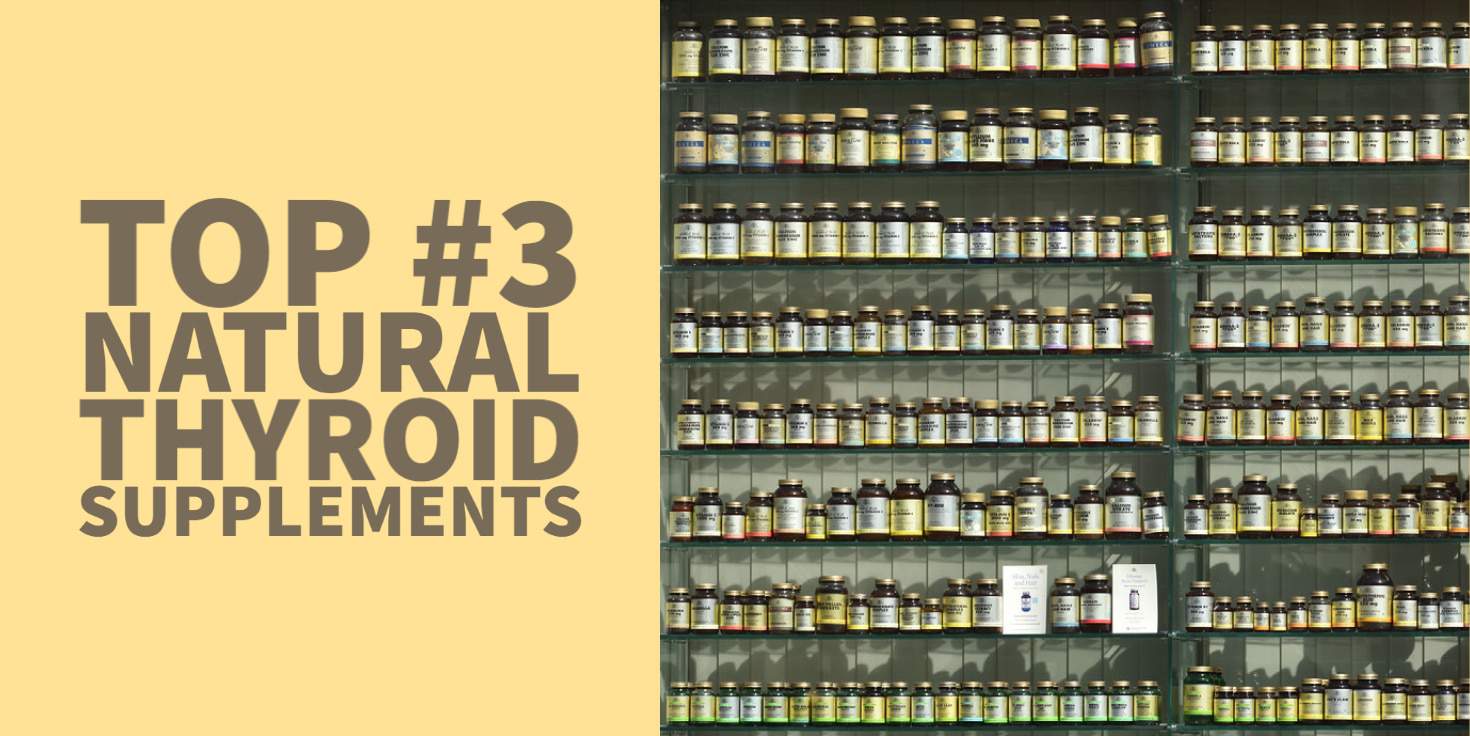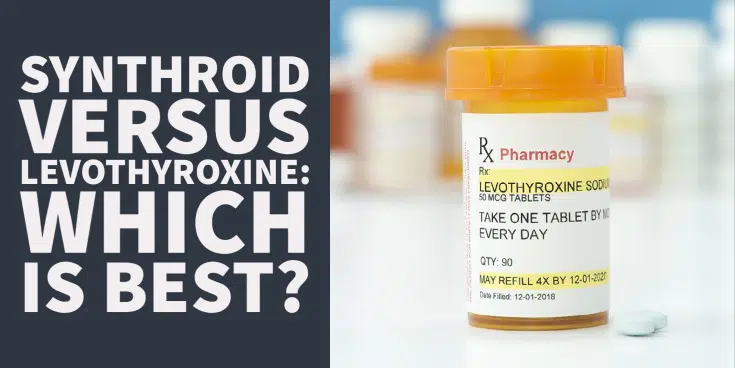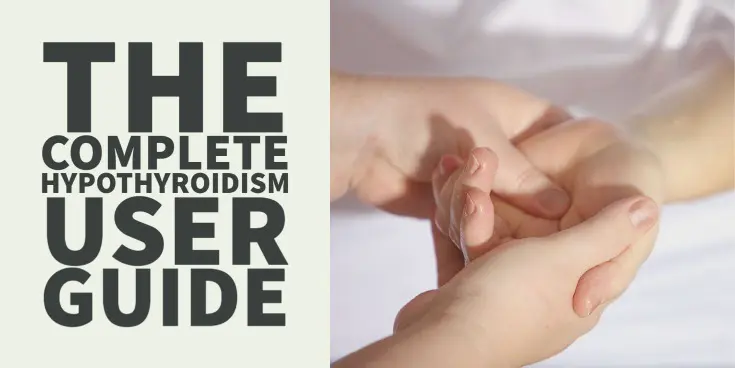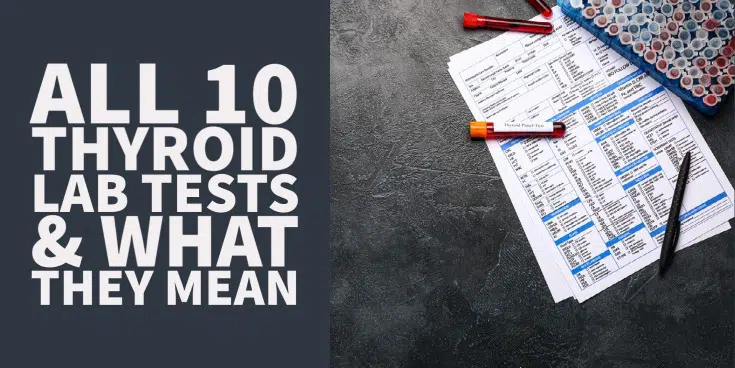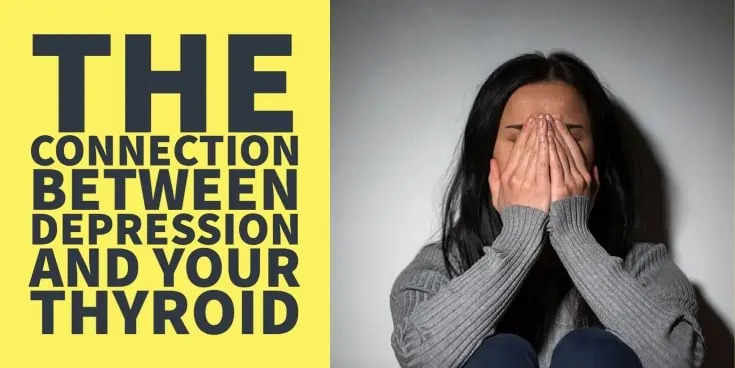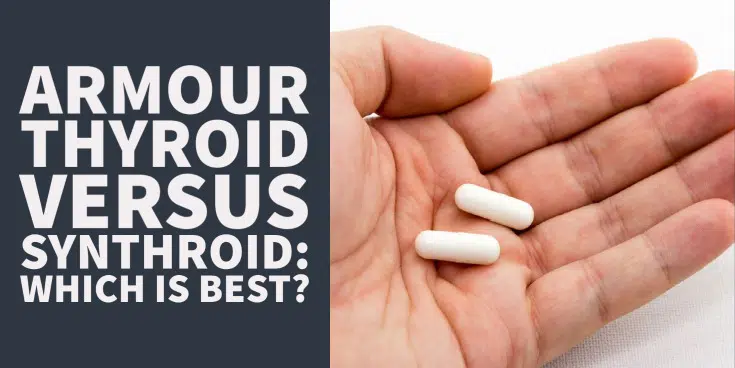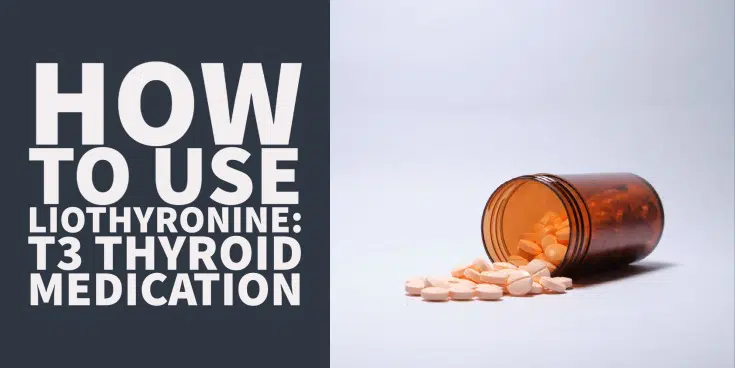Can supplements actually help improve your thyroid function and help with things like weight loss or fatigue?
Yes! They absolutely can and do help many patients.
They aren’t miracle pills, but certain supplements have been clinically shown to improve thyroid function in various ways.
Would it surprise you to know that there are at least 11 different nutrients involved in the production of thyroid hormone?
A deficiency in any of these nutrients may result in DECREASED thyroid hormone production.
Let’s discuss how to take advantage of this knowledge to help increase your thyroid function by using natural thyroid supplements:
How to Increase Thyroid Hormone Naturally
The good news is that you can fix this problem by simply providing the nutrients necessary for thyroid hormone production.
But…
There’s actually more to it than that.

For the most benefit, you want to target your supplementation at the root cause of your problem.
When it comes to your thyroid there are 3 critical steps that can be slowed down which may result in the symptoms of a sluggish thyroid:
- Step #1: Thyroid hormone production(the creation of both T4 and T3 in your thyroid glandular tissue)
- Step #2: Thyroid hormone conversion(the transformation of inactive T4 to the active T3 thyroid hormone)
- Step #3: Thyroid hormone cellular action(the cellular effects that occur when thyroid hormone enters your cells)
Fortunately, there are ways that you can naturally increase EACH of these processes in the body to promote thyroid health.
Before we talk about how to increase these areas we need to discuss why they are so important:
The Importance of Thyroid Hormone Production
This is the AMOUNT of thyroid hormone produced by your body. You need optimal amounts of at least 11 different nutrients for this process to occur.
Supplements that are REQUIRED for thyroid hormone production:
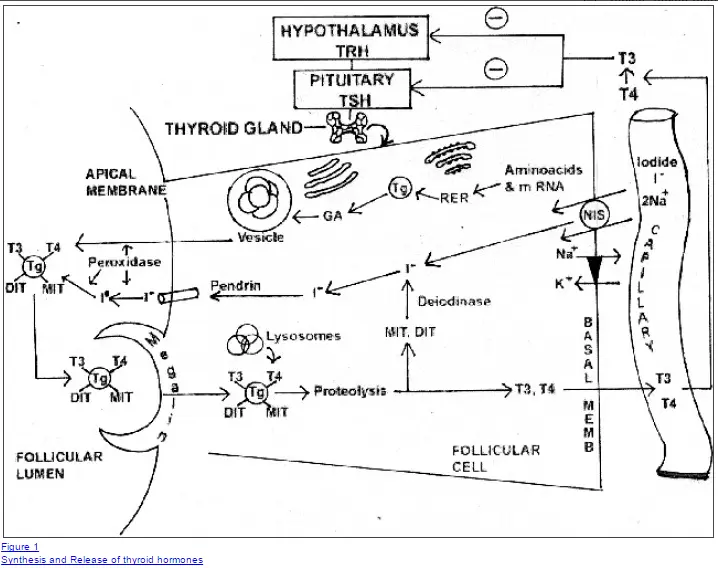
Other factors that inhibit proper thyroid hormone production (these need to be addressed in addition to thyroid hormone supplements):
- Stress(physiologic, emotional and physical)
- Chronic infection or overgrowth syndromes (viral, bacterial, or fungal)
- Certain medications
- Fluoride and other Halides(these concentrate in the thyroid gland and reduce hormone production)
- Toxins and other endocrine disruptors
- Inflammation and autoimmune disease(Hashimoto’s thyroiditis)
It should go without saying that a deficiency in the production of thyroid hormone will result in a hypothyroid state.
This is known as primary hypothyroidism and most commonly this results from damage to the thyroid gland itself (usually from autoimmunity).
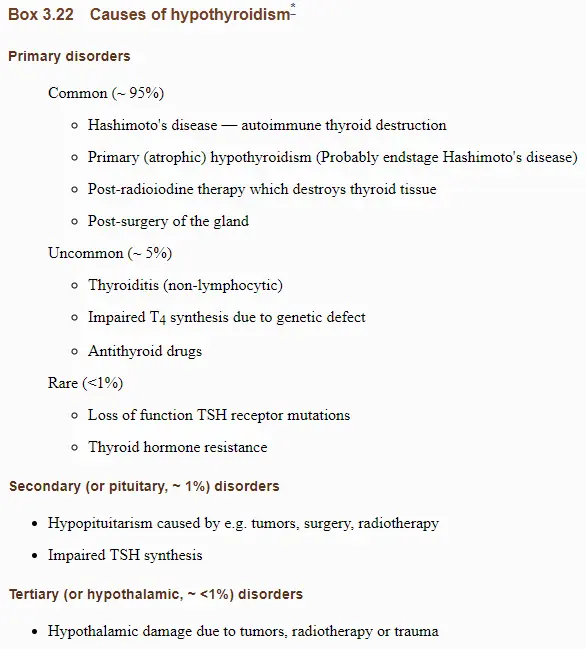
When we talk about the reduction in thyroid hormone it’s important to realize that your body has the innate ability to withstand some degree of damage.
This is why the onset of hypothyroid symptoms tends to be very gradual and occurs over a long period of time.
As the incidents and damage to your thyroid gland accrue the symptoms get worse and worse.
Peripheral Thyroid Hormone Conversion (A.K.A. T4 to T3 conversion)
Next on the list, and probably most important, is the conversion of thyroid hormone to its active form.
As a quick primer:
T3 is the ACTIVE thyroid hormone and in order to become activated it must be converted from the substrate T4.
If you take thyroid medications like Levothyroxine or Synthroid this medication MUST be activated before your body can actually use it.
Deficiencies in nutrients that help with thyroid conversion may result in a build up of T4 thyroid hormone in the body and potentiate the symptoms of hypothyroidism even though you are taking thyroid medication.
In addition, studies have shown that the ability to convert T4 to T3 varies between people and is dependent upon such factors as age, gender, hormone status, and disease status.
Supplements that BOOST T4 to T3 conversion (help your body create more free T3):
- Zinc –> boosts thyroid conversion in deficient patients
- Selenium
- Guggul Extract
- Vitamin A
Other factors that LIMIT T4 to T3 conversion and reduce thyroid hormone levels (these also increase the levels of reverse T3 in your body):
- Stress(physiologic, emotional or physical)
- Low calorie diets or repeated yo-yo dieting
- Systemic inflammation(high CRP/ESR levels)
- Gut inflammation
- Chronic infections or overgrowth syndromes
- Liver dysfunction(fatty liver disease)or other conditions that limit liver function
- Medications(beta blockers, anti-depressants, and diabetic medications)
What Controls Thyroid Hormone Cellular Action
Even if you have sufficient amounts of T3 in your body, you also need to ensure that the cellular action of thyroid hormone is preserved. There are at least 2 different supplements that ensure proper cellular function of thyroid hormone.
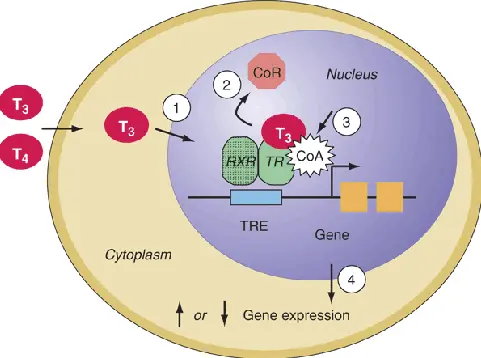
Supplements that help IMPROVE cellular sensitivity to thyroid hormone (they help your T3 do its job in the cells):
Other factors that limit cellular activity of thyroid hormone:
- Industrial seed oils
- Vitamin E deficiency
- Excess estrogen or low progesterone states
- Exposure to xenoestrogens
With these 3 areas in mind we can actually begin to talk about thyroid hormone supplementation.
Does this mean you should run out at go buy a supplement that contains ALL of these ingredients?
No, not necessarily.
In fact, one of the reasons that many patients fail to improve using supplements is that they fail to address the other factors that alter thyroid function.
Under each of the 3 main areas above I’ve also included other factors that do the same thing as nutrient deficiencies.
The takeaway here is that you will want to combine supplementation of nutrients and vitamins with changes to your lifestyle to get the best results.
With all this in mind what kind of supplements should you be using if you have thyroid disease?
I generally recommend against a blanket ‘thyroid supplement’ which contains various nutrients listed above because most people need a more targeted approach.
Instead of focusing on those nutrients I recommend a 3 step approach designed to help increase free and total T3 thyroid levels in your body:
#1. Supplements to Boost Thyroid Conversion
Two particular nutrients are very helpful at increasing T4 to T3 conversion and also at reducing inflammation and autoantibodies (for those with Hashimoto’s): Zinc and Selenium.
While zinc may improve thyroid conversion it will only have this effect in people who are deficient in this mineral.
Fortunately (or unfortunately) there is a high probability that you do indeed have low zinc levels:
It’s estimated that up to 40% of people in the US have a deficiency in Zinc due to soil depletion and a reduction in nutrient dense foods.
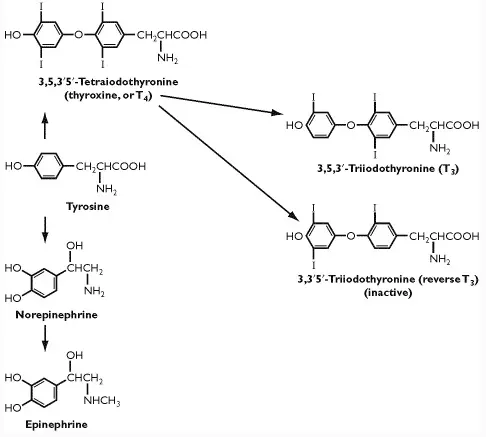
This means that there is a high chance that you have sub-optimal zinc levels.
In addition to improving thyroid function zinc and selenium have also been shown to help in the following ways:
- Boost immune function
- Act as an antioxidant in the body
- Reduce chronic inflammation
- Reduce thyroid autoantibodies
These benefits make the combo of zinc + selenium a perfect match for hypothyroid patients (and those with Hashimoto’s).
Other supplements such as Vitamin A and guggul extract also show promise at increasing peripheral thyroid conversion.
To better promote thyroid conversion I recommend a supplement which contains at least 3 of the 4 supplements listed above:
Natural T3 Conversion Boosting Supplement
- Take 2 capsules each day at least 4 hours away from thyroid hormone
- Each capsule contains precursors designed to help support and promote thyroid conversion including zinc, selenium, guggul extract, and more.
- Use in conjunction with other therapies to further boost T4 to T3 conversion and cellular action.
#2. Supplements that Improve Liver Function
Lowering inflammation will increase thyroid conversion and improve cellular thyroid function.
Up to 80% of thyroid hormone conversion occurs in the liver (which is a huge percentage).
With that in mind it has been shown that liver damage alters thyroid function and may reduce peripheral T4 to T3 conversion, lower total T4 levels and increase thyroxine-binding globulin (reducing available thyroid hormone).
Your liver is also the source of detoxification and metabolism of pretty much anything and everything that you consume.
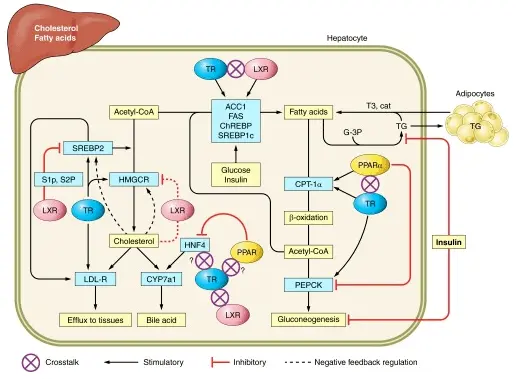
This includes the metabolism of compounds such as endocrine disruptors and xenoestrogens – both of which can interfere with thyroid function.
Improving liver function will therefore improve thyroid metabolism in a number of ways.
How do you know if your liver is properly utilizing?
You can easily evaluate liver function directly by assessing serum levels of AST and ALT (these are VERY common and assessed with most yearly doctor visits).
In addition you can indirectly evaluate liver metabolism by looking at fasting insulin levels and uric acid levels.
These indirect levels will give you an idea if you have fatty liver which is the most common reason for a slight elevation in all of these markers.
Look for these optimal levels:
- ALT –> Should be less than 20 (a marker for cellular damage in the liver)
- ALT –> Should be less than 20 (a marker for cellular damage in the liver)
- Insulin –> Should be less than 5 in the fasting state (higher levels, especially while fasting, may increase the likelihood of non alcoholic fatty liver disease)
- Uric Acid –> Should be less than 5 (Surrogate marker for fructose metabolism in the liver)
When the cells in your liver become damaged they “leak” their enzymes into the bloodstream.
AST and ALT represent your liver enzymes and the presence of elevated liver enzymes (above the optimal range) indicate that there is leakage and therefore damage to your liver.
Elevated AST and ALT levels above and beyond 20 indicate that your liver is not functioning properly and that is a big problem considering the role that your liver plays in the detoxification and elimination of hormones, chemicals, and metabolism of nutrients.
Like thyroid hormone and other hormone levels, there is a wide range of “normal” in regards to the reference range of these specific lab values.
Your liver function tests will not “flag” as high until they reach higher than 40.
But don’t let that fool you…

You want these enzymes to be as low as possible, and even a slight elevation in your AST and ALT may indicate early liver damage.
Improving liver function, in the presence of elevated AST and ALT levels, should be a very high priority to maintain a high level of health.
Fortunately, several therapies can help reduce cellular damage in your liver and improve metabolism overall.
If you find that your AST and ALT are elevated above the 20 range listed then you should consider the use of targeted supplements.
The following supplements have been shown to help improve liver function and help reduce AST/ALT levels: milk thistle, MSM, and/or Ginger with curcumin.
Hypothyroid patients can take supplements to improve liver function which may result in an increase in free thyroid levels and therefore help alleviate the symptoms of hypothyroidism.
#3. Supplements that Address Gut Function & Inflammation
Up to 20% of thyroid conversion occurs in the gut, which makes it a prime target for improving thyroid function naturally.
In addition, up to 50% of thyroid patients suffer from a combination of constipation, diarrhea or small intestinal bacterial overgrowth.
All of these conditions may result in gut inflammation which can lower thyroid conversion and reduce nutrient absorption.
Taking supplements designed to improve gut health will result in several benefits specific to thyroid patients:
- Increase absorption of thyroid hormone (if you are taking thyroid medication) -> this is especially helpful if you are taking medications with fillers/additives or dyes like Synthroid or levothyroxine.
- Increase thyroid hormone conversion and free/total T3 levels.
- Increase absorption of critical nutrients like iron and B12 -> these nutrients help increase thyroid function as well as increase energy levels.
- Help with weight loss -> by increasing thyroid conversion and by altering caloric absorption.
- Help improve immune function
- Reduce both local and systemic inflammation -> another indirect way of improving thyroid function in the body
- Reduce constipation and regulate bowel movements
Treating your intestinal health can be complicated but the first place to start is with a high quality probiotic.
I recommend using a multi strain, multi species probiotic that contains at least 100 billion CFU/serving.
Do Thyroid Hormone Supplements Have Side Effects?
As long as you purchase high-quality supplements you should be able to avoid most of the side effects that some people report when taking thyroid supplements.
As a word of caution:
Some thyroid supplements may contain portions of thyroid glands from animals or other sources that contain ACTIVE thyroid hormones.
This is the equivalent to taking a prescription medication in the United States.
I strongly recommend against the use of supplements such as these because they WILL interfere with your HPA axis and may make your body reliant upon the supplements.
For this reason it is best to avoid productions that come from questionable sources and stick to nutrients and precursors that can be identified and that are known to not contain active thyroid hormones.
As a thyroid patient you will also want to be wary of cheap inactive ingredients which may also cause negative reactions in your body…
How to pick out the best Supplements
I recommend against purchasing your supplements through online stores or places like GNC, Walmart, Costco or other grocery like stores.
The reason is simple:
These companies mass produce supplements but don’t take care to provide thyroid patients with ALL of the ingredients necessary required for proper thyroid function.
They also tend to cut corners to reduce the cost and include inactive dyes, fillers and other ingredients which sensitive hypothyroid patients may react negatively to.
Also, they may include low quality iodine sources or unmethylated B vitamins which further reduce the quality of the supplements.
If you have hypothyroidism and you are searching for a high quality supplement I recommend that you look for supplements with the following attributes:
- Thyroid supplements should NOT contain gluten, dairy, soy, artificial sweeteners, GMO’s, artificial colors or artificial preservatives
- Thyroid supplements should contain activated and pre-methylated B vitamins (if applicable to your supplement) -> you can find an example of activated B vitamins in this supplement
- Thyroid supplements should contain therapeutic dosages of various nutrients (these are the dosages that have been studied and shown to work)
- Your supplements should be produced in a GMP compliant facility and manufactured in the United States
By the way, all of the supplements recommended in this article fit the criteria listed above.
Back to you
Bottom line?
You can naturally improve your thyroid function by addressing 3 steps:
#1. Thyroid hormone production.
#2. Thyroid hormone conversion.
#3. Thyroid hormone cellular action.
There are certain supplements that can help at each one of these steps which will naturally increase free and total thyroid hormones in your body.
For best results make sure you seek out high quality supplements that fit the standards necessary for hypothyroid patients.
Now I want to hear from you:
Have you taken thyroid supplements before? Did they work for you?
Why or why not?
Leave your comment below!
